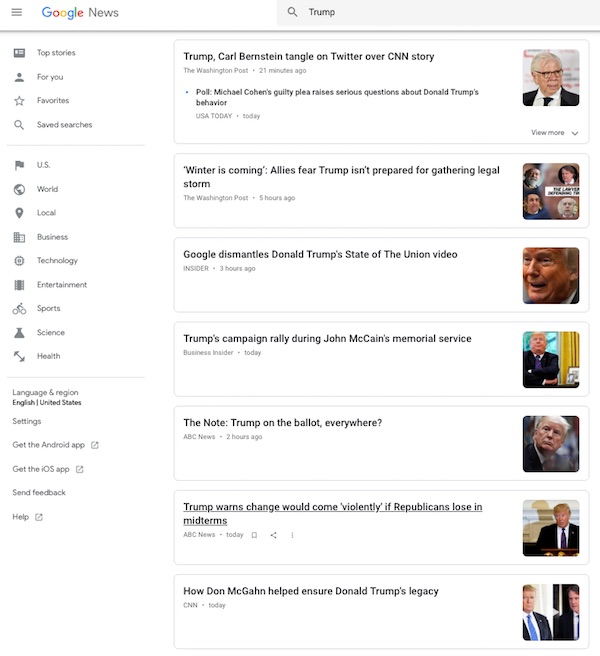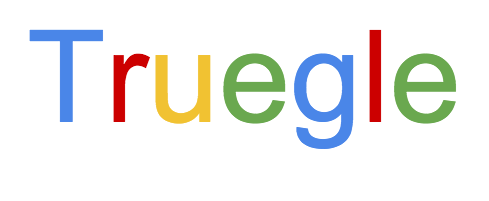Truegle: Building a Google clone that lives up to Trump’s ideals
Donald Trump has accused Google of bias, saying that 96% of Trump News searches result in media with a left-wing bias. His economic advisor Larry Kudlow has said the government will look into regulating sites like Google. To determine the validity of Trump’s complaint, let’s invent a new Google search called “Truegle” that would live up to Trump’s ideals, and see how the world would look.
Here’s are Trump’s tweets about bias:
….results on “Trump News” are from National Left-Wing Media, very dangerous. Google & others are suppressing voices of Conservatives and hiding information and news that is good. They are controlling what we can & cannot see. This is a very serious situation-will be addressed!
— Donald J. Trump (@realDonaldTrump) August 28, 2018
So let’s use the eyeball test.
Note: If you want to replicate the results I’m showing here, make sure you are using an incognito window or “anonymous browsing” — instructions are in the link. Remember that Google changes your search results based on past search history; an incognito windows starts you with a fresh slate. (And it’s nice to know that incognito mode is useful for something other than surreptitious porn viewing.)
Here’s the search that Trump is referring to: go to Google News and search “Trump”:

Now you can see Trump’s point. The top news items are from The Washington Post (2), USA Today, INSIDER (2), ABC News (2), and CNN — all mainstream media outlets that Trump doesn’t trust. (Insider is a relative newcomer, but is certainly not a beacon of conservatism.)
I looked for conservative outlets in this list. The 40th item is from the Wall Street Journal, a publication sympathetic to Republicans (although Trump might say its news side, as opposed to its editorial and opinion pages, is still “mainstream media”). The article is “The New Lobbying: Qatar Targeted 250 Trump ‘Influencers’ to Change U.S. Policy.” To my view, this article seems balanced — it’s mostly about Qatar’s activity, not Trump’s, and quotes former Trump strategist Steve Bannon. But it’s nowhere near the top of the search results.
To understand the challenge here, there’s no clearer explanation than Hiawatha Bray’s article in the Boston Globe, “Trump is out to get Google. But is Google out to get him?” I’ve read Bray for years and he’s quoted me in Globe articles; his reporting is solid and unbiased, and his personal politics lean conservative. Here’s part of what he wrote:
But take a close look at Attkisson’s chart [on which the study of liberal vs. conservative news sites is based]. On the left side, you’ll find sites such as The New York Times, Washington Post, CNN, Bloomberg, and USA Today. On the right side, you’ll find The Wall Street Journal, Fox News, the New York Post, the Drudge Report, National Review, RedState, Breitbart.
Notice anything? A handful of her right-of-center choices are major news outlets; the rest are niche publications that don’t attract a broad mainstream audience. Even the best-known of them aren’t the highest-ranked sources for news. On the left side of the line, you find the bulk of American mainstream media, sites that are read by tens of millions of us, regardless of our politics.
I confirmed this with a visit to Alexa, a company owned by Amazon that tracks the most popular Internet sites. On Alexa’s list of the world’s top 50 news sites, hardly any of Attkisson’s conservative sites make the cut. Fox News is seventh, but the Drudge Report is 19th, the Wall Street Journal is 20th, the New York Post is 23rd.
Meanwhile on the left, CNN ranks at No. 3, trailing only Google’s own news page and, in first place, the popular Internet hangout Reddit. The New York Times is fourth, the Washington Post 10th, Bloomberg is 16th, and USA Today is 18th.
Here’s an even more important criterion: How many other Internet sites link back to these news sites? The more sites that link to, say, the New York Times, the higher the Times’s ranking in Google’s search algorithm.
It turns out that about 304,000 sites worldwide link to the New York Times. That’s a massive vote of confidence that tells the Google algorithm to prominently display stories from the Times because people trust it. CNN has 210,000 linkbacks, the Washington Post has 112,000, and USA Today has 92,000.
By contrast, the Wall Street Journal has 128,000 linkbacks. But Fox News has just 76,000, the New York Post has 41,000, and the Drudge Report a measly 8,000.
In short, Google’s algorithm lets the Internet vote on which news sources it trusts the most, and few right-leaning sites make the cut. If you don’t like it, don’t blame Google. Blame the millions who’d rather get their news from the Times or the Post than from Breitbart.
Let’s see what Google would look like in Trump world
 Trump wants these conservative sites to rank higher. So let’s invent a new search engine, called “Truegle,” for Trump-sympathetic Google. Truegle works just like Google, except that its top results in news searches must come from conservative news outlets. (If you’re a clever coder, you could go ahead and create Truegle — and truegle.me is available right now as your URL.)
Trump wants these conservative sites to rank higher. So let’s invent a new search engine, called “Truegle,” for Trump-sympathetic Google. Truegle works just like Google, except that its top results in news searches must come from conservative news outlets. (If you’re a clever coder, you could go ahead and create Truegle — and truegle.me is available right now as your URL.)
So let’s see what Truegle would show on some current items in the news.
The Trump deal on nukes in North Korea has fallen apart recently, and Secretary of State Mike Pompeo cancelled his trip there. So what does Truegle show for a search on “Trump North Korea” ? You won’t see “White House casts blame on China for North Korea Challenges” (CNN) or “Trump says Pompeo won’t go to North Korea, criticizes denuclearization progress” (CNN). Instead, these are your top search results:
Trump defends Russia and North Korea meetings, attacks ‘overrated’ Bob Casey at Pennsylvania rally (Fox News)
Japan to set up coastal surveillance to check North Korea boats (Breitbart)
North Korea accuses U.S. of Plotting Invasion (Infowars)
Williams: Bad Men, Good Presidents. (Daily Wire)
Here’s what Truegle would have you reading about Betsy DeVos’ suggestion that the government pay to arm teachers:
Betsy DeVos can and should let schools use federal funding to arm teachers (Washington Examiner — actually appeared #3 in Google News results)
Democrats seek to use spending bill to block Trump administration proposal to arm teachers (Fox News)
Drones, Drills and Bulletproof Backpacks: Are We Militarizing Our Schools? (Forbes Contributor)
MSNBC Contributor: Teachers Might Shoot Minority Students if They’re Allowed to Carry Guns (Washington Free Beacon)
What about Trump’s “wins?” Here’s what Truegle would tell you about the possible trade deal with Mexico:
U.S.-Mexico Trade Pact Faces Scrutiny From Lawmakers at Home (Wall Street Journal)
Oil Prices Settle Lower on U.S.-Mexico Trade Deal (Wall Street Journal)
What Will The Mexico Trade Deal Do To Car Prices? Buckle Up. (Forbes Contributor)
‘Nobody Thought We Could Do It’: Kudlow Says US-Mexico Trade Deal Protects Workers & Promotes Growth (Fox News)
Here’s my question: is Truegle a good source of news?
If you read Truegle’s recommended news, you would have missed the fact that the North Korea talks have broken down and that North Korea is in a position to start rebuilding nukes, after Trump declared victory. You would be plunged into a petty political fight about guns and schools, without much balanced analysis of the pros and cons. And on Mexican trade, you’d be hearing both sides and raising questions, which is pretty much what you’re hearing from “mainstream media” anyway.
Truegle would be a mixed bag that elevates conspiracy theories and Forbes’ random “contributors” to appearing right next to actual news reporting from the likes of the Wall Street Journal.
Google’s News algorithm promotes the stories and sources that people link to and click on. Many of these are “mainstream media” outlets like CNN and The New York Times. This is not because they are biased, it is because they are more popular than fringe sites like the Washington Free Beacon.
Tilting the algorithm in the Truegle direction would surface less popular, less dependable, poorly sourced content at the expense of actual newsgathering sites. The whole point of Google’s algorithm is that it doesn’t put a thumb on the scale — it lets the readers decide.
If you want to live in a world like this, just keep clicking on Fox News and The Washington Examiner and Breitbart in your search results. Google will learn, and it will show you more of what you want to see.
But if you want to live in a world where search shows you the most dependable, most useful sites, leave Google’s algorithm alone. Go ahead, be skeptical of what you read. But don’t ask Google to become Treugle, or you’ll start living in a world where alternative facts live next to real ones, truth is not truth, and ignorance is strength.
But don’t call it Truegle. Call it Falsegle.